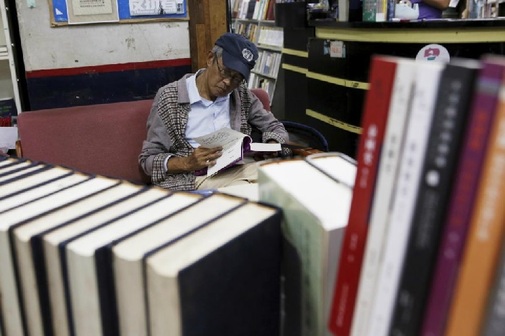On the floor there are only chalk marks that indicate the location where each shelf will be. The room measures no more than 60 meters and through the windows enters the luminosity of a tenth floor. There are still two weeks left, after the Lunar New Year , so that this place becomes a bookstore.
The man who is going to run it comes dressed in his usual cap. He lifts his glasses to inspect each corner and ask them to clean the dust spots at the corners. "This is going to be the rebirth of Causeway Bay, " he says looking longingly at the past. One in which Lam Wing-kee was the most famous bookseller in Hong Kong . In Causeway Bay you could find all kinds of books that were not in mainland China . Famous was the bound story about the love life of Chinese President Xi Jinping. Also another entitled The Seven Taboos , which dealt with irony about everything that was prohibited in the communist regime.
Lam Wing-kee is no longer the most famous bookseller in Hong Kong. He doesn't even live there anymore. His exile in Taiwan marks the life of a 64-year-old man who spent eight months in prison for the crime of selling banned books in China . That is why we find him on the tenth floor of a building in the Zhongshan commercial district, in the center of Taipei, ready to open a new bookstore that now has only the name: Kaishi Dachi .
Escape from Hong Kong for possible extradition
"I will maintain the spirit of the Hong Kong bookstore, any interesting work will be welcome, there will be no censorship but a meeting place and knowledge for anyone who wants to read freely," explains Lam.
The man fled from Hong Kong last April for fear of an extradition law, which was eventually withdrawn, but that would have allowed the Chinese authorities to bring him to justice to face the accusation of running an illegal business. This is how they saw from Beijing the bookstore that Lam founded with four other partners in 1994. And so, at the end of 2015 , all were arrested and taken to Shenzhen , a border city with the former British colony. The reason: sell critical books to the Communist Party .
"They blindfolded me and locked me in a room for eight months. Two people were constantly watching me and three cameras filming all my movements. All the time, they asked me the same questions: Who writes those books? Who buys them?" , Lam said in a massive press conference as soon as he was released on bail. He had agreed with the Chinese agents that he would go to his old bookstore and give them the hard drive where he had all the names of the clients who had bought works on the private life of the communist leaders of China . Instead, the bookseller decided to make his captivity public.
Opening on January 29 after a 'crowdfunding'
Now, in Taipei , he has managed to raise thanks to a crowdfunding campaign about 179,000 euros to rent a place and reopen his bookstore. "I hope that on January 29 we can open," says Lam. He feels lucky. He managed to flee and now he will continue with a business to which he has dedicated more than 30 years of his life. His other four colleagues in Hong Kong remain imprisoned for selling banned books.
Back to China, if one walks through any library of cities like Beijing, there are dozens of bibliographic books on Xi Jinping and many others on the "socialism with Chinese characteristics" of the ubiquitous Chinese president. There is not a page that addresses any topic - other than tourism - related to the three "T": Taiwan, Tibet and Tiananmen . Nor less friendly biographies of a Chinese leader. No science fiction novels that go beyond the standards set by the Communist Party. Not even any work by Nobel Peace Laureate Liu Xiaobo or more alternative literature such as the gay novel, Beijing Comrades , by writer Bei Tong .
Censorship in the General Press Administration
Censorship in the literature that reaches the Asian giant usually goes before the hands of the General Administration of Press and Publications, who is responsible for deciding which books are appropriate for the people to openly access them. Or to which of them it is necessary to make a slight creaking. Like 'A happy world' by Aldous Huxley , who dissects, among other issues, the politics of fear executed by many nations to control citizens. In the Chinese part, the censors worried about eliminating direct references to the Mao Zedong era .
The reality is that it is very complicated to get to the blacklist of banned books. According to a report by Australian researcher Michael Bachelard for The Age magazine, Chinese censors do not consent to any "mention of political dissidents, protests or relevant figures in Chinese politics, including President Xi Jinping ."
If a somewhat fiddly novel with the premises dictated from Beijing comes, by chance, to the shelves of a bookstore, the employees have all the power of the Law (the Ministry of Education of China ordered last year to all Primary schools and Secondary "clean" their libraries of "inappropriate books" to "create a healthy and safe environment for education") to remove the works. Even to burn them. As it happened a couple of months ago. The image went around the world: two employees of the Zhenyuan State Library burning a mountain of illegal books.
According to the criteria of The Trust Project
Know more- literature
- China
Language Pedro Álvarez de Miranda: "There is little room for rebellion in the language"
Awards Ana Merino and Manuel Vilas: the couple that triumphs in Spanish literature
Culture Literary tribute to Galdós in Madrid

